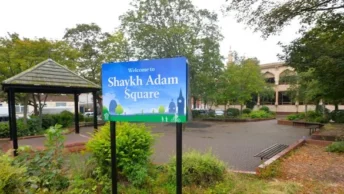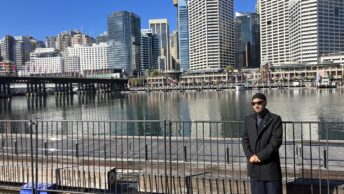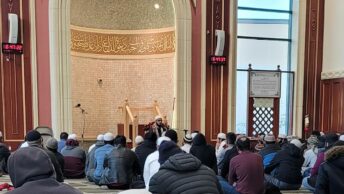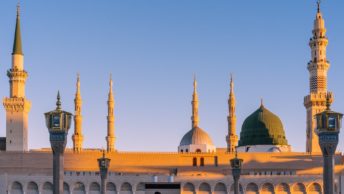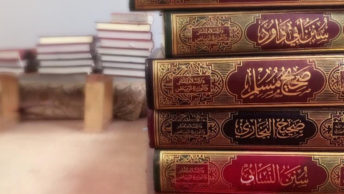(A brief account of Mufti Muhammad ibn Adam al-Kawthari’s recent trip to Norway, compiled by Sidi Muzakar Amin of Oslo, Norway)
Knowledge-based Spiritual Retreat with Mufti Muhammed ibn Adam al-Kawthari in Norway, 2008
Bismillah al-Rahman al-Raheem
Alhamdulillahi Rabbil alamin, wassalatu wassalamu ‘ala khatamil anbiyai wal mursalin.
We had the blessing of Mufti Muhammad ibn Adam al-Kawthari’s company here in Norway from Thursday 3rd July to Sunday 6th July, 2008. This was his second trip to Norway, the first when he visited the capital, Oslo last year. (A brief overview of that trip is presented below this article). We were around 20 brothers in a cottage up in the mountains, north of Oslo. The lessons first and foremost covered Fard Ayn knowledge. Below is a summary of the trip, including some of my notes from the lessons and our conversations. The details might be wrong, and the order of happenings is retold without certainty:
The first session on Friday was about the importance of seeking sacred knowledge (ilm). He started his lesson and gave an overview of Islamic sciences, and explained the Jibril hadith and the three fundamental parts of religion being Iman, Islam and Ihsan. He explained how severe ignorance (jahl) is, and that nations fell because of it, and of jahl basit [simple ignorance] (being aware that one doesn’t know) and jahl murakkab [compound ignorance] (not being aware that one doesn’t know).
“Allah will raise up, to (suitable) ranks and (degrees), those of you who believe and who have been granted knowledge. And Allah is well-acquainted with all you do.” [Qur’an 58:11] This entails that the greatest Ni’mah after Iman is Ilm. There was also a mention of the verse: “Say: Are those equal, those who know and those who do not know?” [Qur’an 39:9]
He told about two ways by which Allah guided (hidayah) humanity: 1) Sending of Messengers (inzal al-rusul), and 2) sending of books (inzal al-kutub). The first Madrasah was As-Suffah, and our deen is continuous (musalsal) back to the sahaba (Allah be pleased with them) and the Messenger of Allah (Allah bless him & give him peace).
Details were given regarding the hadith “ta’labu al ‘ilmi faridatun ‘ala kulli muslim” (Seeking of knowledge is obligatory upon every Muslim, Sunan ibn Majah), that it’s a unconditional (mutlaq) order, therefore it includes both the Fard Ayn knowledge and the Fard Kifayah. Certain aspects of Islamic knowledge is personally obligatory like learning the basics of Taharah, Salat, Zakat, Hajj, etc, whilst the deep understanding of the various Islamic sciences is a collective responsibility, in that if some individuals carry out this responsibility, it would be fulfilled from everyone.
He explained that there are basically three ways of learning: 1) Sitting with the Ulama, 2) Reading books, 3) Asking the scholars.
We then went to a ski lift to get to the top of the nearby mountains, had picnic and prayed Dhuhr Salat there, and then returned to the cottage.
The next lesson was on Aqida (Creed). Mufti sahib told us how we Muslims are of a middle way, whereas Christianity is spirituality with few rules, and Judaism is rules with little spirituality. “khayr al-umuri awsatuhu wa-kilta tarafayil umur tameem” (the best of all affairs is the middle path and both extremes are reprehensible). And also Surat al-Fatiha is a proof of this. The Mufti went into the details of our Aqida regarding Ilahiyyat (aspects one needs to believe in regarding Allah Most High), but there was no time for Nubuwwat (aspects relating to the Prophets) or Ghaybiyyat (matters of the unseen world). He discussed the issues of Tawhid (oneness of Allah Most High) and Shirk (associating partners with Allah) in relative detail. He told us about the different sects in history, about Imam al-Ash’ari and Imam al-Maturidi, and the history relevant to them.
Regarding using intermediaries whilst supplicating to Allah (tawassul) and such, my understanding of what he explained is as follows:
- Tawassul bil a’mal: using one’s actions as an intermediary
- Tawassul bil ahya: using a living person as an intermediary, due to Allah’s love for that person.
He explained that these two levels are accepted by all Muslims. Among other proofs for these two types of Tawassul is that Umar did it through Abbas (Allah be pleased with both), and the famous hadith of three people in the cave. He said that the Salafis only allow the above two levels and draw a line here. - Tawassul bil amwat: using dead persons as intermediaries. This is also permitted and has many proofs such as the Hadith of Uthman ibn Hunaif related by Imam Tabrani in his Al-Mu’jam al-Kabir.
He said that the mainstream Deobandi scholars draw a line here, and allow only until this third level. - Istighatha bil amwat ‘an tariq al-tawassul: (istighatha is to call someone by name, even if they are absent, such as saying “Madad Ya Rasul Allah”, believing Allah is the One who helps in reality through means. In other words, asking the pious deceased to make dua for you to Allah, asking them to intercede for you to Allah, etc.
The Ulama of Deoband do not allow this 4th level as a way of blocking the means to falling into level five (below) which is not allowed. However, many others do allow it provided one’s Aqida is sound. He said that all the Muslim draw a line here. - Istighatha ghayr Allah haqiqatan: Asking others and calling them by their name believing that they can help independently, or that Allah has given them power in certain areas where they are able to do things independently. He said this is Shirk and not permitted according to all Muslims.
During the barbeque that followed, there was some discussion about what one needs to do to ensure the chickens in Norway are halal, about every chicken being checked and the HMC in UK.
Next lesson was on Taharah, about the difference between nazafa (un-cleanliness) and najasah (ritual impurity). Then we went through all the fard ayn knowledge including the different kinds of water (purifying and pure, used pure and impure water), how to determine what category the water is in, what is najis and not. Masah (wiping) can only be done on leather socks (khuffayn), not on regular socks, the conditions and method of Masah (which is actually illogical, because the logical thing to do is to do Masah underneath, while the Sunna is to do it on top of it).
Wudu is broken by:
- Everything that exits from the front or back private parts,
- From other places of the body if there is najasah coming out (regarding mouth: if there is more blood than spit)
- Sleeping (not only dozing which is being able to notice what two persons in the room are talking about) without having the bottom firmly placed, which happens when the joints of the body are loose (e.g. when leaning onto something)
- Qahqaha (laughing so others can hear it) during prayer. (As a side note, Mufti sahib mentioned that the Prophet (Allah bless him & give him peace) has never been reported to have done this, just smiling.)
We were also taught the rules of the excused person (ma’dhur) in detail, how one becomes a Ma’dhur, how one remains a Ma’dhur and how one seizes to be a Ma’dhur. The Ma’dhur person’s wudu is broken by other things which break the wudu other than what makes him a Ma’dhur. A Ma’dhur’s wudu lasts until the end of each prayer time. That entails that if he is to do wudu’ during the period of time between sunrise (tulu’ al shams) and istawa (zenith), then that wudu’ may last until the end of Dhuhr.
We were also taught the details of Janaba, Ghusl and Tayammum, even though this was just before Fajr Salat (approximately 1.30 am at night!). After offering Fajr, we all had some much needed sleep.
On Saturday, our first lesson was on Salah, the importance of it, and the rules of it. He explained that offering Salat on time is Fard, in congregation (jama’ah): wajib, and for men in the Masjid: Mustahab.
We went through the Faraid and Wajibat of salah.
Regarding making mistakes in prayer, he explained that one may do one of four mistakes during prayer:
- Missing a fard act,
- Delaying a fard
- Missing a wajib
- Delaying a wajib
The first category makes it obligatory to pray the prayer all over again, whether one is praying behind an Imam (muqtadi), Imam or praying alone. The last three categories (if done forgetfully) makes it necessary (wajib) to make the prostration of forgetfulness (sujud sahw) if one is an Imam or praying alone, but a muqtadi doesn’t have to worry.
Regarding prohibited and disliked times for prayer; he explained that there are five times we should remember:
All Salah prohibitively disliked (makruh tahrimi):
- Sunrise,
- Zenith (wrongly often called zawal, which is the declining, it is in reality istawa),
- Sunset Only optional (nawafil) makruh tahrimi:
- After praying Fajr until sunrise
- After praying Asr until sunset
We then went on a trip to a beautiful waterfall in the vicinity. The Mufti actually did Wudu in the water, and it was so pure that one could drink it. There was a bridge over the river. We crossed it to eat and pray Dhur Salat. Some brothers took a dive into the river as well.
After returning, we had a Q&A session. I’ve only taken some very few notes:
In this fatwa about photographs found on https://daruliftaa.com/miscellaneous/photographs-please-clarify-your-position/, Mufti sahib hasn’t mentioned taking digital pictures, so I asked about his opinion about it. He answered that it seems as if they take the ruling of video recording because of the similarities.
Fasting is not broken by intravenous injections, even if it is glucose, though the reward is lost. There was a long answer about medical issues, and I was busy in the kitchen, so I didn’t catch it, except the notes of a friend.
There is no rukhsa for handshaking the opposite gender, except for maybe really old women if there is absolutely no fear of fitnah, and the woman is very old. And many other questions were answered.
Instead of trying to go through the Fiqh of business and trade, which was not possible because of lack of time, we had a Q&A-session specifically on that as well. Many of the Q’s were regarding Islamic banking and mortgage, interest-problems and such.
The last session was a lecture about Sufism (tasawwuf). He mentioned the Jibril hadith, and staying in the middle path (being a Sufi while still keeping within the boundaries of Shari’ah) and there was much more. He especially made a point of not being hung up in names. If someone doesn’t want to call it Tasawwuf, then let them call it Tazkiyat ul qalb or whatever they want. It doesn’t change the thing in itself, it’s just a name.
He explained that purification of the heart is Fard. Learning it from a Shaykh in Tasawwuf is necessary and giving Bay’ah to a Shaykh in Tasawwuf is Sunnah.
On Sunday morning, we left the cottage with our guests, and drove to Oslo (the capital) for some sightseeing. After that we had lunch at one of the participant’s family’s house. Then we greeted the guests, and had our fill for this time of the Barakah of Mufti sahib.
Wassalam
Muzakar Amin
Mufti Muhammad ibn Adam’s trip to Norway in May, 2007
Assalam ‘alaykum
Alhamdulillah, it was wonderful. I had the opportunity to drive the Mufti around and to show him and his friends Norway. Very beneficial.
The Mufti first gave a talk at Jumu’ah about Islam being both internal and external, in a Masjid. Unfortunately I missed it due to giving Khutbah at another place. This was partly in Urdu and in English.
Later in the evening, a brother invited the Mufti and some friends to a dinner. After the very good meal, the Mufti gave a short talk about the importance of acquiring knowledge, and how our priorities should be (Aqidah, Fiqh, Ihsan), and the different rulings and such. During the Q&A, a brother asked about the claim of there being necessity (dharura) and thus the permissibility or otherwise of riba. The Mufti gave a detailed answer about the 3 different levels of dharura, hajah (need) and istihsan (beatification), and what they entail. How the beard and moustache should be in detail was also a subject.
Saturday morning, we went to the ski arena, up in the ski jumping tower. Really nice view from the top. Then we went to an old castle with a view to the coast and the boats. At last we took them to a place on the hills next to the city, from where there is great view of nature, the sea and the city.
Then there was a dinner at another friend’s house. Here we also met the other two lecturers, from the Harun Yahya foundation in Turkey.
Later on, the Mufti held a lecture in Urdu in a Masjid about Da’wah and relations with non-Muslims. He usually doesn’t give lectures in Urdu, but he is mashaAllah just as good to give talks in Urdu as in English.
After that there was a small gathering where both the Mufti and the two from Turkey gave lectures. The Mufti’s talk was quite general. Unfortunately, I didn’t catch the beginning of it. He gave the talk in both Urdu and English, very interesting.
On Sunday, he held the main talk at the MSA Conference that he had been invited for, about submission and what it entails being a Muslim, about hikmah and ‘illah, the story of Ibrahim and Ismail (alayhima assalam). The second lecture he gave was about the importance of hadith, unfortunately there was little time, but the Mufti really managed to make his point clear. He finished this talk using the example of the changing of the Qiblah in the Qur’an.
Alhamdulillah, I’ve learned so much from the Mufti’s visit, both a little Aqidah and lots of Fiqh and Ihsan. My personal conversations while driving him and his friends were about gender intermingling, Taqdir and Dua, keeping the order in Salah, his Tasawwuf, whether or not there is limitation in Ibadah, and some private questions. I felt a kind of satisfaction, as if all my questions had been answered (unfortunately, I think I bothered him too much with questions, astaghfirullah).
May Allah bless him for the Ilm and Barakah he brought us.
Wassalam ‘alaykum
Muzakar Amin, Oslo, Norway

